 Guitarist William Tyler’s Modern Country was one of my favorite drive-time listens of the summer of 2016. I was so busy enjoying it, I didn’t get around to writing about it until now!
Guitarist William Tyler’s Modern Country was one of my favorite drive-time listens of the summer of 2016. I was so busy enjoying it, I didn’t get around to writing about it until now!
First, about the title. It’s amazing how many layers of meaning can be attached to two simple words. Of course the first thought that occurred to me was about modern country music and the deplorable state of most of the music coming out of “official” Nashville. But there are just a whole slew of possible ways to think about those two words, their combination and their juxtaposition. One of the associations that popped into my mind right off was of another guitarist, Bill Frissell, and the way he fuses American country motifs into a jazz setting, for a particular take on “modern country” music that’s all his own.
Turns out I wasn’t so far off base with that association. Because on this record, his fourth, Tyler steers clear of the kind of noodling that can infest so many instrumental guitar albums, focusing instead on some solid and beautiful melodies. The folks at Merge, the powerhouse independent label that put out Modern Country agree with me in Tyler’s one-sheet: “These aren’t pop songs, per se, but they are closer in spirit to Neu!, Penguin Cafe Orchestra, and Bill Frisell.”
This video EPK will give you a taste of what the album’s like.
I’m tempted to call these individual pieces “songs” rather than “tunes” because of Tyler’s strong sense of melody and the superb arrangements featuring his backing band: multi-instrumentalist Phil Cook (Hiss Golden Messenger, Blind Boys of Alabama), bassist Darin Gray (Tweedy, Jim O’Rourke), and percussionist Glenn Kotche (yes, that Glenn Kotche).
The album seems to turn around the melodic, mildly psychedelic, nine-minute opening track “Highway Anxiety.” This hypnotically repetitive tune is the very essence of a road trip through barren but interesting landscapes. It’s followed by the jaunty melodicism of “I’m Gonna Live Forever (If It Kills Me) and “Kingdom of Jones,” a focused fingerpicked melody that calls John Fahey to mind and hints at old-time country melodies.
The second half of this short album gets a bit more esoteric, after the gently loping “Albion Moonlight” with its layers of bluesy slide guitars and a little churchy organ. There’s the episodic “Gone Clear” with sections that range from jaunty to scary-clown portentousness, colored by droning bass synth, layers of dark-toned guitars and percussion skittering and occasionally booming.
After the pastoral, finger-picked “Sunken Garden,” there’s a touch of Richard Thompson’s Celtic-Americana tone and techniques with an overlay of soaring psychedelic electric guitars and synth drones, in the waltz-time closer “The Great Unwind.” After a brief section of ambient outdoor sounds including springtime bird calls, the song resumes as a shuffling march that slowly fades into the sunset.
I mentioned guitar touchstones Thompson and Fahey, but throughout Modern Country Tyler reveals a deep familiarity with popular music in many genres. Although his playing is nothing like M. Ward’s, Tyler possesses a similar ability to drop snippets of familiar melodies into his own compositions, everything from the Carter Family to The Beatles. From start to finish, though, Modern Country presents Tyler’s unified vision of a vast country that awes and inspires him. It’s one of those albums that you’ll want to put on repeat and let it inspire you.
(Merge, 2016)
